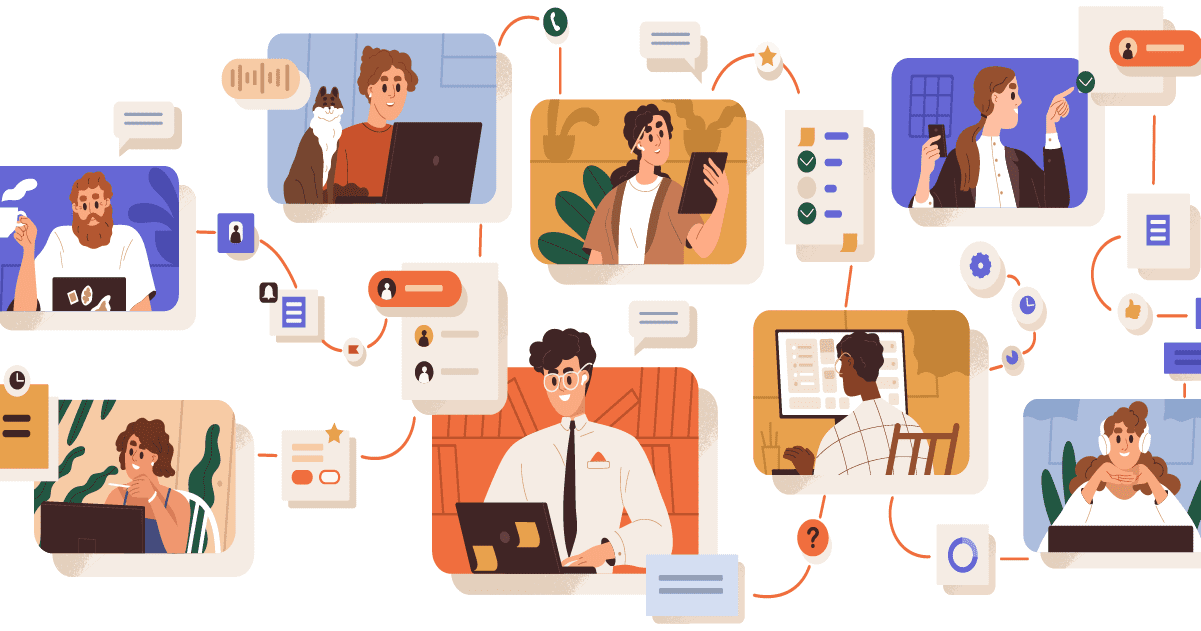- Laurie Wherley
- May 3, 2023
In today’s highly competitive job market, both job seekers and businesses are looking for innovative and effective methods to assess the candidate’s fit for the job. One method is the interactive job interview or the working interview. Interactive job interviews involve a two-way conversation between the candidate and interviewer and require the candidate to perform job-related tasks to demonstrate their skills.
In this blog post, we will explore what an interactive job interview is, provide tips on how to successfully conduct an interactive job interview, and discuss how this interview method can be particularly beneficial for on-demand and hourly staffing models.
What is an interactive job interview or working interview?
An interactive job interview or working interview is a hands-on interview where the candidate is asked to perform job-related tasks to demonstrate their skills. This type of interview is often used in industries such as warehousing, hospitality, and construction, where skills and experience are critical to the role being done successfully. Working interviews can last anywhere from a few hours to a few days and provide the candidate with a realistic preview of the job.
During an interactive job interview, the candidate is given the opportunity to demonstrate their skills and experience in a practical setting. They may be asked to perform tasks such as loading a pallet, preparing food, or building a simple structure. The employer can observe the candidate’s performance on-site and evaluate their ability to perform the job duties effectively.
Interactive job interviews can be beneficial for both the candidate and potential employer. For the candidate, they provide a more accurate representation of the job and allow them to determine whether the role is a good fit. For the employer, they provide a more accurate assessment of the candidate’s skills and fit for the role. According to a study by the National Bureau of Economic Research, working interviews are a reliable predictor of job performance and can lead to higher retention rates.
It’s also important to note that interactive job interviews should be paid, as the candidate is performing actual work. According to the Fair Labor Standards Act (FLSA), if the candidate is performing work that provides an immediate advantage to the employer, they must be compensated for their time.

Why interactive job interviews are a good fit for on-demand and hourly staffing models
According to a study by Harvard Business Review, the on-demand labor market has seen a 400% growth rate since 2010, and this trend is expected to continue. This staffing model requires candidates who can work efficiently and effectively in a fast-paced environment, often with little or no on-site training. Interactive job interviews and working interviews are particularly suited for this type of staffing model, as they allow employers to assess a candidate’s skills and experience quickly and accurately. These methods also create a positive candidate experience, which can lead to a better-quality pool of candidates.
The five benefits of interactive jobs interviews for businesses
1. Better understanding of the candidate’s skills and experience
During an interactive job interview, the interviewer can gain a better understanding of the candidate’s skills and experience by asking follow-up questions and having a conversation. This approach can provide a more complete picture of the candidate’s abilities and help the interviewer make a more informed business decision. According to the Society for Human Resource Management (SHRM), 41% of employers consider skills assessment to be one of the most challenging aspects of the hiring process. Interactive job interviews can make this process easier and more accurate.
2. Improved candidate experience
A positive candidate experience can create a better impression of the employer and increase the likelihood that the candidate will accept a job offer. Interactive job interviews can create a positive candidate experience by allowing the employer to show their interest in the candidate’s thoughts, opinions, and ideas. The interviewee is also given the opportunity to feel more comfortable and confident in the interview process. According to a survey by Glassdoor, 76% of candidates believe the interview process is an indicator of how the employer values its employees.
3. Opportunity to assess cultural fit
Assessing cultural fit is critical to determining whether a candidate will thrive in an organization’s culture. An interactive job interview can help employers evaluate a candidate’s communication style, personality, and values, which are all important factors in cultural fit. Interactive interviews can help ensure that candidates are a good fit for the organization.
4. More accurate assessment of soft skills
Soft skills, such as communication, problem-solving, and critical thinking, are often as important as technical skills in many roles. However, they can be difficult to assess through traditional interviews. An interactive job interview can provide a more accurate assessment of these skills by allowing the interviewer to observe the candidate in a conversation and evaluate how they handle challenging questions or situations. A Linkedin study found that 59% of employers believe that soft skills are the most difficult to find among job candidates.
5. More engaging for the interviewer
Interactive job interviews can be more engaging for the interviewer. They allow the interviewer to have a more dynamic conversation with the candidate and learn more about their experience and qualifications. This can lead to a more enjoyable interview experience for both the interviewer and the candidate.
The easiest way to conduct interactive interviews
Jobble offers businesses the opportunity to conduct interactive job interviews to enhance their candidate evaluation and engagement process. Our solution allows businesses to create job postings with detailed descriptions and required skills, and then find and hire temporary or permanent workers.
Businesses can use Jobble’s staffing solution to set up interactive job interviews with potential candidates. With Jobble, businesses can conduct working interviews on-site, allowing hiring managers the opportunity to observe the candidate’s skills and performance in a real-life and real-time scenario. This can provide a more accurate assessment of the candidate’s abilities, leading to better hiring decisions.
Our solution offers pre-employment screening to assess a candidate’s skills and knowledge in various areas. Employers can use this information to tailor their interactive job interview questions and scenarios to better evaluate the candidate’s strengths and weaknesses. Using Jobble businesses can evaluate the candidate’s performance during the job through performance-based interviews. Employers can provide feedback and assess the candidate’s fit for the job based on their performance and behavior on the job.
Ready to enhance your hiring success with interactive job interviews? Schedule a demo to see Jobble’s staffing solution in action and start conducting working interviews with ease.
Five tips on how to successfully conduct an interactive job interview
- Prepare a list of open-ended questions: Rather than asking yes or no questions, prepare a list of open-ended questions that will encourage the candidate to expand on their experience and qualifications. This will provide you with a better understanding of the candidate’s skills and experience.
- Be an active listener: During the interview, be an active listener and engage in a two-way conversation with the candidate. Ask follow-up questions and provide feedback on their responses. This will help you build a connection with the candidate and gain a better understanding of their fit for the role.
- Provide a realistic preview of the job: Use the interactive job interview as an opportunity to provide the candidate with a realistic preview of the job. Describe the job duties and responsibilities, and provide examples of the types of challenges they may face in the role. This will help the candidate determine whether the role is a good fit for them.
- Evaluate soft skills: Use the interactive job interview to evaluate the candidate’s soft skills, such as communication, problem-solving, and critical thinking. These skills are often as important as technical skills in many roles and can be difficult to assess through traditional interviews.
- Follow up promptly: After the interview, follow up promptly with the candidate to let them know the outcome of the interview. This will help build a positive candidate experience and create a good impression of your organization.
By following these tips, you can conduct a successful interactive job interview and find the best candidate for your role.
Ready to get started?
To sum it up, interactive job interviews or working interviews are an excellent way to assess if a candidate is a good fit for your business in today’s shifting job market. This interview method is a clear winner for on-demand and hourly staffing models and Jobble offers a comprehensive staffing solution to help you get started with conducting working interviews seamlessly. By following the tips in this blog post, your business can conduct successful interactive job interviews and find the best candidate for your open jobs.










